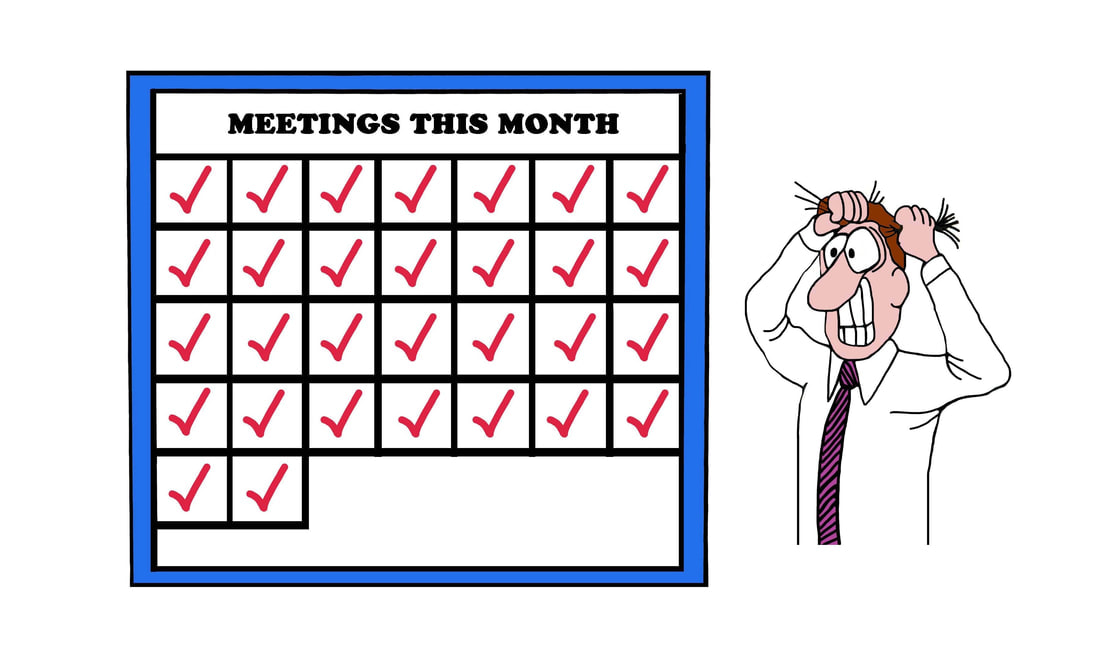|
Feel like constant meetings are hanging you up? Set a regular meeting with yourself.
Meetings and more meetings. Just as you finish one call, you are dialing into the next one. Need to go for toilet break? Forget it -- there’s another meeting. This meeting situation was already insane before the pandemic, and it it has only gotten worse now with so many people working from home. There are dozens of articles about how to spend less time in meetings, how to reject meetings without looking bad, about 2/3 of our life being spent in meetings. All these articles trying to help us save ourselves. Yet many of us keep falling into the meeting trap. I have yet to find the magic formula for myself, however I do believe I am becoming more aware about how I am actually spending my time versus how I want to spend my time.
0 Comments
Once upon a time, there was a man named Jack who struggled with communicating effectively with his wife, Jane. He would often get defensive and shut down during arguments, causing tension and frustration in their relationship.
One day, Jack decided he needed to make a change. He had heard about a technique called Neuro-Linguistic Programming (NLP), which could help him improve his communication skills and build stronger relationships. With the help of an NLP coach, Jack learned a variety of tools and techniques to improve his communication with Jane. Here are a few of the most effective techniques he learned: Limiting beliefs are negative thoughts and assumptions that hold us back from achieving our goals and reaching our full potential. They can be deeply ingrained and often go unnoticed, but they can have a significant impact on our lives if left unchecked. In this article, we'll explore some effective ways to manage limiting beliefs and overcome your inner critic.
Identify Your Limiting Beliefs The first step in managing limiting beliefs is to identify them. Start by paying attention to your inner dialogue and noticing any negative thoughts that come up. These thoughts might include things like "I'm not good enough" or "I'll never be able to do that." Once you've identified your limiting beliefs, write them down and examine them more closely. Ask yourself whether these beliefs are based on facts or whether they are simply assumptions. Here’s what I’ve done:
I blocked my calendar for a 2-hour meeting with myself one Friday morning a month. At this meeting with myself, I reflect on my activities. This has helped me to become more focused, improve as a professional and be more aware of how I use my time. One Friday morning per month, I ask myself questions like these:
To answer these questions, I look through my calendar for the past month and reflect on what I can do to improve my performance. If you try this for yourself, you might notice that you have had a more assertive/challenging style of leadership. Or you may observe that your primary emotions were frustration and anger, and that your energy tank tended to be half empty all the time. Awareness of these issues could be the trigger you need to figure out how to change your behaviour in order to better achieve a desired result. Without realising it, we often operate on autopilot. Setting some time apart to reflect, effectively turns off autopilot and allows us to take control back again. So, why not try it? Set a monthly 1:1 with yourself in your calendar, grab a Nespresso cup of coffee, put on some music, relax and enjoy answering some questions about you, for you. Having worked in the supply chain field in big organizations for quite some time, I have heard a few times how number-driven we are, how we trust metrics, lean six sigma methods over an empathetic, listening and coaching approach.
I can counteract this argument with an authentic success story, a story of people over numbers. It is January. It is raining. It is cold and foggy. The holidays are just over and a big project meant to improve the warehouse operations of our third party logistics is assigned to me. It is the kind of project that has a huge scope, resources still unknown, challenging timelines and tons of traveling involved. Sound familiar? Well, it turned out to be one of the greatest personal experiences and most successful projects I have ever worked on. And you know what made it such a masterpiece? People. Yes, you heard that right: People. Feel like constant meetings are hanging you up? Set a regular meeting with yourself.
Meetings and more meetings. Just as you finish one call, you are dialing into the next one. Need to go for toilet break? Forget it -- there’s another meeting. This meeting situation was already insane before the pandemic, and it it has only gotten worse now with so many people working from home. There are dozens of articles about how to spend less time in meetings, how to reject meetings without looking bad, about 2/3 of our life being spent in meetings. All these articles trying to help us save ourselves. Yet many of us keep falling into the meeting trap. I have yet to find the magic formula for myself, however I do believe I am becoming more aware about how I am actually spending my time versus how I want to spend my time. Opinion editorial by The American Genius
Photo by krakenimages on Unsplash Anthony J. Algmin is the Founder and CEO of Algmin Data Leadership, a company helping business and technology leaders transform their future with data, and author of a new book on data leadership. We asked for his insights on how strong leaders can see their teams, their companies and their people through this global pandemic (and other crises in the future). The following are his own words: Managers sometimes forget that the people we lead have lives outside of the office. This is true always, but is amplified when a crisis like COVID-19 occurs. We need to remember that our job is to serve our teams, to help them be as aligned and productive as possible in the short and long terms. By Susan Begeman Steiner
Honoring emotions is an important element in achieving Emotional Intelligence. And your moods – both “good” and “bad” -- are an important part of your emotional being. Learning to flow with your moods and be honest about them gives you more individual self-expression and even self-confidence. Have you noticed that things go more smoothly when you are in the mood to do them? Traffic lights change to green and you find a great parking place when you’re in a good mood. And when you’re in a bad mood, seems like almost everything goes wrong? Moods, good and bad, come in their own timing, so practically speaking, how can you capitalize on the good moods and mitigate the bad moods? Good moods are easy. Whenever possible, do things when you're in the mood to do them. Then you hit the green lights or, if you don't, you're not as likely to get upset about it. But what about the bad moods, when you just aren't in the mood to do something you have to do? How can you get yourself in the mood to enjoy what you’re going to do? Here are 3 keys that can help: By Marcel Schwantes
Are you a negative person? If you're at the point where you're seriously looking to shift to the positive, step one is to change your attitude and alter your perception about your current situation. Since that may border on cliché, allow me to suggest a practical plan of action focused on three mental hacks that work. This will take some commitment and intent, but it's what the most positive people have mastered. Elon Musk Once Gave Some Surprising Business Advice - 4 Years Later, It's Clearly Quite Brilliant9/8/2018 By Marcel Schwantes
Does a high IQ contribute to success? Certainly. But not without hard work, experimentation, failing forward, and an undying devotion to self-improvement. Take Elon Musk, one of the smartest people on the planet. The driving force behind Tesla, SpaceX, and OpenAI is never satisfied with where he is, and he knows that there's always room for improvement -- whatever the challenge he's tackling at the moment. But he takes the cake with this quote from a 2014 interview: You should take the approach that you're wrong. Your goal is to be less wrong. To Musk, being wrong (and failing) is always an option because if you're not, he says, you're not innovating enough. This is what we call a growth mindset -- the ability to fail, learn something new, and then approach the problem from a different angle until you find a solution that works. By Judith E. Glaser
I have yet to meet an executive who joins a company to be ‘minimized,’ marginalized or to be intentionally held back from making a contribution. We join a company to make a difference, to make a contribution, to be praised and rewarded. We join a company to bring our voice to the table, and ‘lean into conversations’ so our voices join in the spirit of partnering with others to shape, create and co-create the future. Neuroscience is teaching us that ‘self-expression’ might be one – if not the most important way for people to connect, navigate and grow with each other. By Davide Costella REWARD. Just by reading this word, your memory can be stimulated to recall those experiences you have had linked to REWARD and a given thought or behavior can be triggered. This process is totally unconscious. The aim of this article is to raise your awareness about how you process rewards. I recently went through a stimulating and successful period in my life where I achieved a number of milestones, one after the other. I enjoyed successes that were both private and business-related, some quite impactful, others slightly less. During this time, there was one situation that had a strong emotional impact on me and triggered a totally different way of thinking about rewards. This particular project was a long and cumbersome one -- one of those projects where you give 150%, where personal reward is the real drive, not bonus or promotions. My epiphany moment occurred when the project finally went live. Due to geographical distance, I was unable to celebrate with the rest of the team. Although I received some compliments, I did not feel completely rewarded. An emotional thunderstorm hit me and triggered various questions and some lessons learned about how we reward ourselves. See the points below. Before you read these points, remember that the actual definition of reward is: Something of value given in return for an act. ... Click 'Read More'... by Davide Costella
Having worked in the supply chain field in big organizations for quite some time, I have heard a few times how number-driven we are, how we trust metrics, lean six sigma methods over an empathetic, listening and coaching approach. I can counteract this argument with an authentic success story, a story of people over numbers. It is January. It is raining. It is cold and foggy. The holidays are just over and a big project meant to improve the warehouse operations of our third party logistics is assigned to me. It is the kind of project that has a huge scope, resources still unknown, challenging timelines and tons of traveling involved. Sound familiar? Well, it turned out to be one of the greatest personal experiences and most successful projects I have ever worked on. And you know what made it such a masterpiece? People. Yes, you heard that right: People. So what made it so different from any other supply chain project? What did we do to make people more significant than the usual key performance indicators (KPIs)?
None of these are magic tricks. They are things that will work only if you truly believe in what you're doing.. If you do not, it is better you do not practice them at all or you will likely cause the opposite effects. If you strongly believe in people over numbers, share this post as many as you can. Let others be inspired as well! |







 RSS Feed
RSS Feed